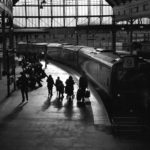I have worked professionally for eight years now and have used several different film and digital camera systems, but using Leica was always an aspiration though I could never justify the costs. Apart from that, I have learned the hard way that a top-end camera can become your master. Although they can give you an advantage and help give you better negatives or files, an expensive camera does not make you a better photographer.
By 2008 I realised that my work was being completely dictated by my clients and I invariably only shot a certain type of picture for a specific marketplace. This had stunted my creativity and almost stopped me from making pictures because I rarely made any that I was proud of or enjoyed. I needed to be able to express myself through my photography again and to rediscover the pleasure that comes with that. I felt that I had to do something new and do it just for me. So two years ago I began a new body of work, far removed from my background as a landscape and severe weather photographer.
I had tired of making pretty pictures: illustrative, easy to view, often easy to make, but rarely thought provoking (although they do have their place and I still have to make a living). The world is awash with garish colour landscapes and glorious sunrises, perfect scenes created by digital cameras, often with little application of skill from the photographer. They are then made even more “perfect” by a computer programme. After a lot of soul searching my first task was to free myself from my tripod and medium format, something that quickly felt liberating. Finding a balance between image quality and being able to make pictures quickly, spontaneously and without too much thought was important. After all, many of photography’s classic images are just snapshots and when it comes down to it the average viewer is not concerned about the type of camera used or how it was taken.
So I started wandering with one camera, one lens and a few rolls of film. Initially with an old Canon EOS 1N or a Ricoh GR1V compact, but when I was lucky enough to be gifted a Leica MP, this totally changed the game and with it my photography. I decided to work predominantly with black and white film, to look more at shape and form rather than relying on strong colours. Film also helps me to shoot what’s in my mind, rather than constantly adjusting my approach as a result of chimping. Apart from that, I sense that life is changing for many people now and I just don’t feel this in colour. It is widely said that as photographers we have a responsibility to tell the truth, but this extends to sharing our own unique world views, our own truths.
Suddenly with the Leica MP I was learning all over again and revisiting skills I had forgotten. It took a while to feel like I was achieving. Working with a rangefinder without autofocus made me think about what I was doing and I worked harder. It made me get it right in camera and reduced post processing, almost forcing me to be more creative. And when you do get it right, the negatives really shine.
This was the motivation I needed, and it provided me with an exciting way of working when I didn’t want to make pretty pictures. Walking the mean streets of North East England is perhaps my greatest personal challenge, as I have always avoided people in my work. I may have photographed tornadoes and lightning up close and personal, but nothing has scared me as much as making pictures in public spaces. I found myself way out of my comfort zone! But the streets are full of surprises, spontaneity and the realism I was unknowingly searching for. Anders Petersen is correct in that we should find what we are afraid of and use it as a springboard forward. This fear is all part of a process of professional and personal change and most importantly I am making pictures for me, even if I don’t know exactly where that will lead. Emmet Gowin said that “in order for any of us to do anything new, we can’t know exactly what it is we are doing” and I certainly don’t know.
Themes are starting to appear in the pictures, and the more I shoot the better I see because the Leica makes me consider my subjects carefully. My technique is becoming stronger as I have started to research and learn again, thinking more about what I did correctly, as well as what I did wrong. This has become my way of exploring the world around me and part of my struggle to express myself. Photography is communication and you have to somehow find your own true voice.
In a lifetime a father can provide a son with many things: a home, food, support, advice and opportunity are just a few of them, but the gift of a Leica might just be one of the most important.
-Roger Coulam
You can see more of Roger’s work on his website, www.rogercoulam.com and he also blogs at www.rogercoulam.com/blog.

Comments (9)